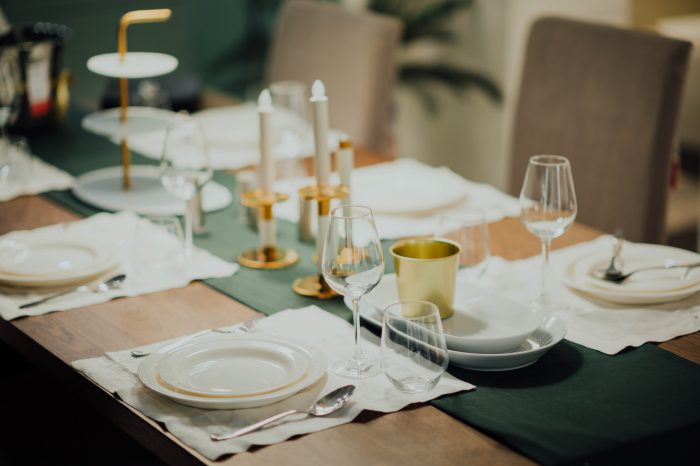*Editor’s Note: This piece is part of a series—lucky you. Head to the author’s profile to continue reading, or start with Chapter One.
~
When was the last time my mother picked up her china?
The last time she put it away, after a special occasion?
Her aneurysm was in April, 1983. Maybe she took it out for Passover that year. No, she would have used the Passover dishes, stored in a cardboard box in the basement. Maybe New Year’s Eve? She made a fancy dinner every New Year’s, just for family, before everyone went out. Prime rib, Coquilles Saint-Jacques served in scallop shells, a chocolate mousse with raspberries.
The year of her aneurysm was my first year out of college. I was living on Cape Cod, and probably didn’t come home for New Year’s. Whenever she used those dishes for the last time, nobody knew it would be the last time. And now—it’s been decades since anyone touched them. Decades since she’d even seen her kitchen, where she prevailed in my childhood, except for those times when she didn’t.
My mother’s first breakdown happened when I was three and a half. I don’t know the story exactly, but for sure there was a suicide attempt and then she ended up in the hospital. The hospital was a psych ward called Hannah Pavilion. She stayed there for many months while the doctors did what they could to stabilize her brain. That meant shock treatments. Later, when I was older, she’d tell us the shock treatments always helped her. Electroconvulsive therapy, ECT, as it’s officially called, is still considered an effective treatment for major depression when medication fails.
She was my mom, though. And then she was gone. And I was lost.
Cared for, yes. Loved, yes. By my father, by my grandmother—my mother’s mother who came to stay with us when my mom went to the hospital—but still, bereft, as any child would be, when Mom is suddenly gone.
I was forever looking for her, looking for the home I no longer had. When she went away, absence became familiar. The kitchen no longer carried her presence. Instead, the breakfast table was a place where she was not.
I don’t remember her first breakdown but I remember another time, I must have been about seven:
I live in books. I’ve got stringy, blonde hair, and am beanpole skinny. My mom makes the best spaghetti sauce in the world. I love to smell it bubbling on the stove when I come home from school. And brownies. A fresh pan of brownies for dessert, or an after school snack. Brownies with walnuts are my favorite, warm from the oven. I come home from school one day and smell brownies on the stove, and I rush into the kitchen. My mom’s not there.
It’s Granny Frieda, smiling, singing. She stands in front of the stove in her pink and blue flowered dress. “Your mother’s upstairs,” she tells me.
I run up to her bedroom.
My mom has become a stone. A face without a smile. A face with no expression. A nightgown in the middle of the day, and worse than that, she’s going to the hospital. She tried to take her life again—sleeping pills, or the gas on in the car when the garage door’s shut—
Why does she try to take her life away from me?
She’s my mom, my only one.
Where are you, Mommy, when you go so far away?
~
After the Seder, when everyone’s gone home and my dad’s upstairs in bed, I survey the kitchen. The leftovers have been put away in the fridge. Most of the dishes are in the dishwasher. Just a few pots and pans to be scrubbed. A tray with crumbs from Matzo needs to be cleaned. The plate that held asparagus is now empty.
I rub my eyes, stretch my arms up to the ceiling. It’s been a long day. It was a long trip from Taos yesterday and I’m tired. I’ve made a big decision in coming back to Cleveland this time. I already had a plane ticket, since I usually come home for Passover. But I’ve changed the return date. I’ve canceled it entirely so I can stay as long as I need to.
Since my mom died, my dad’s fallen several times, and has been having hallucinations. Sometimes he sees my mom, younger, in a red nightgown. Sometimes it’s the UPS guy. The other side seems close to him. He’s almost 90 and they were married for almost 60 years. He cared for her at home for decades. Maybe he’s ready to go—but I’m not ready to lose him. When my sister called me last month to ask if I could come for a while, to stay in the house with Dad, I agreed.
I stand on the linoleum floor, look at the white cabinets, and feel a familiar tug to the cupboard on the right of the stove, where the Oreos and Chips Ahoys still live. As a teenager, in this kitchen, cookies were my nemesis. Not just cookies. Chocolate chips, straight from the crinkly yellow bag. Ice cream, while I stood next to the fridge, late at night. Food was everything, so much more than I understood. Once I began, I couldn’t stop until the whole bag was empty, the whole container was in my mouth.
I’m 55 years old now. Three years older than my mother when an aneurysm changed the course of her life. My life in this house will become impossible if I start eating my dad’s cookies. I know how sugar affects me and I don’t eat it anymore. But oh, how I want to—open that cupboard door, take out the package, put those cookies into my hand, into my mouth. Bite into that sweet, chewy dough. Then I’ll open the freezer. See what kind of ice cream my dad has. Take it out, let it melt a little, until it’s soft enough to eat, and start putting creamy spoonfuls into my mouth, maybe add some fudge sauce…
I pull my hand back from the cupboard door. Stop. I’ve worked hard to get some sanity with sugar. But I’ve sublet my house in New Mexico. I’m here for at least a month. My beautiful kitchen, well stocked with organic spinach and kale, extra virgin olive oil, and garlic from the farmer’s market is far, far away. What was I thinking? Packing such a big suitcase, putting all my things into storage?
I stare at the pots and pans. Feel my feet collapse under me. I grab hold of the counter. It’s too much, being here. I sink down until I’m sitting on the cold floor. Minutes pass. Or is it hours? A lifetime of memories haunt me in this kitchen.
Then I call out. I demand, beg, plead, pray. I ask for my grandmas and aunts and friend Linda to be with me. None of them are alive anymore, but they come. They’re all around me, helping me turn away from those cookies and back to myself. Slowly, carefully, I stand up.
The floor is solid under my feet. My legs are steady. I’m not alone in this kitchen anymore. They’re with me—all my angels from the other side.
~
It’s so quiet. The refrigerator has stopped its incessant hum. I find myself listening for my mother’s breathing. She slept in the den on the first floor since she couldn’t climb the stairs to her bedroom. She slept so lightly that any time I’d come down the stairs, no matter how early or late, she’d hear me and say something.
“Can you turn the TV on?”—at five in the morning.
I’d be up early for a few minutes of quiet, and to go outside for a walk in the first light of day. She’d want the TV on as soon as she woke up.
Or midnight. I couldn’t sleep and would come down to make a cup of tea.
“I’m cold, can you bring another blanket?”
It was always cold in the den. Too much air conditioning in the summer, because the rest of the house needed it. Not enough heat in the winter, because the other rooms were warm enough. But it was the best room for the hospital bed, which replaced the couch long ago. I can barely remember the couch anymore—I think it was blue. Dark blue with a textured black pattern. Instead, she had a chair that was blue. A plush blue velvet recliner, the color of a calm summer sea. When she wasn’t lying down in her bed, she sat on the blue recliner; the pole for the feeding tube stood beside her chair.
It’s all still there: the hospital bed, with a light blue blanket, her chair, covered with a few layers of protective pads, even the pole for the feeding tube. But the bed’s empty. I don’t hear her heavy breathing or her soft, scratchy voice. She’s gone. Or perhaps she’s everywhere. No longer sleeping in the den but floating around the house, looking at the pots and pans she hasn’t cooked with for years. Picking up her fine china, puzzled, perhaps, that it’s so dusty, wondering why no one’s used it all this time.
~
To the reader: At the end of Chapter One, I had just opened the cupboard where my mother’s china had sat, untouched, for three decades. My mother died after a long journey with a debilitating illness, and after her death, I returned to my parents’ home. It’s the first night of Passover, and I’ve just served Matzo ball soup in her soup bowls which have not been used for 33 years. After the Seder, I’m in the kitchen again, uncovering more layers of my own psyche.
Whatever your relationship is with your own mother, whether she’s dead or alive, healthy or frail, our mothers have a primal place in our lives. And so do our mother’s kitchens! What memories do you have of your mother’s kitchen? Favorite dishes that she prepared for you? Laughter and joy, or tension and fear? Whatever blend of emotions you associate with your mother’s kitchen, I invite you to let this story take you to your own memories, and let those memories touch your heart today, and speak to you.












Read 8 comments and reply